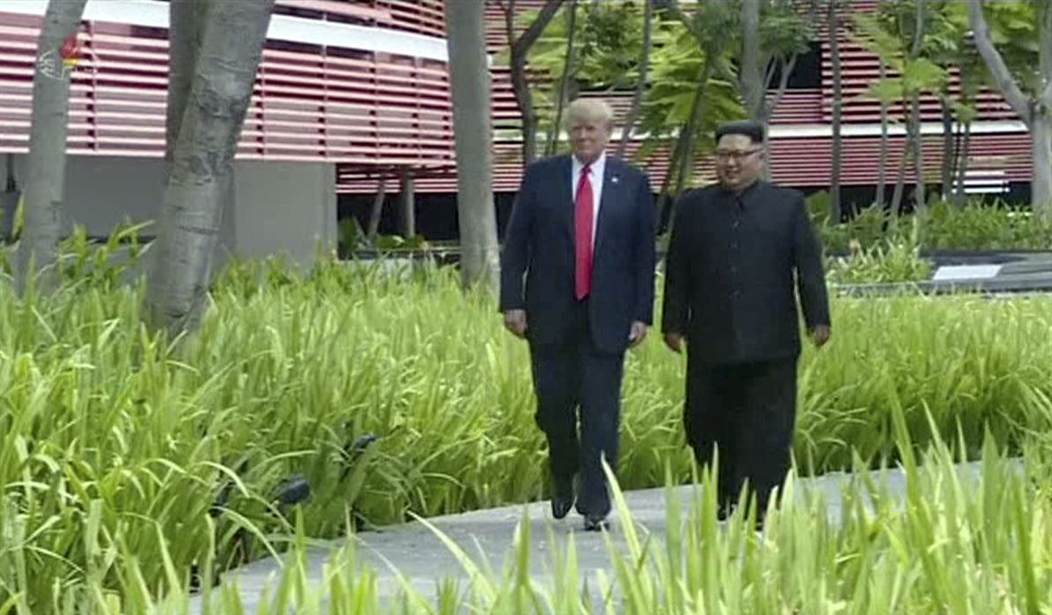WASHINGTON - The vague, detail-free agreement that President Trump and North Korean dictator Kim Jong Un signed this week raises more questions than answers.
Beyond its intention to “denuclearize” the Korean Peninsula, a promise North Korea has made many times before, only to break its word, there is very little substance in the pact that Trump euphorically called “very, very comprehensive.”
For the time being, Kim arguably got far more out of the agreement than the U.S. or South Korea did.
He was awarded a rare, high level moment on the world stage with the president of the United States, declaring his general willingness to get rid of his nuclear armaments, but without any details about how he would deliver on that promise.
In return, Trump offered a few unexpected concessions of his own that shocked South Korea. He said he would suspend further U.S. military exercises with our faithful ally, saying that such “war games” were “provocative”, a term often used by Pyongyang to condemn U.S military “war games.”
And in another concession that surprised our Asian ally, Trump suggested he would like to withdraw some of the 30,000 U.S. troops in South Korea.
Trump described his proposal to abandon the joint military exercises as “his concession as an exchange for North Korea’s destruction of a test site for missile engines. But that demolition took place before the summit — and is in no way comparable to the freezing of exercises, which could signal that the U.S.-South Korean security relationship is up for negotiation alongside North Korea’s arsenal,” the Washington Post said in its lead editorial Wednesday.”
Recommended
The administration says that such details will be worked out in future talks, led by Secretary of State Mike Pompeo. But the loose, free-wheeling format appeared to render the pact signed by Trump and Kim as a prescription for short-changing South Korea’s national security.
“To me, it was quite disappointing that we really did not put on paper any way that would test the seriousness of Kim Jong Un,” Joseph Yun, who was the administration’s special representative for North Korea policy, told the Post.
“We have to suspend our judgement” until more details emerge, he said, but added “there is nothing from the meeting to say we’ve achieved anything.”
There was also broad skepticism among Republicans on Capitol Hill in the immediate aftermath of the Trump-Kim summit, and the release of their brief agreement.
Sen. Rob Portman of Ohio said he was “skeptical but hopeful” that the negotiations would result in North Korea destroying its nuclear weapons.
“North Korea has used talks to stall while continuing its nuclear and missile programs, and empty promises cannot buy any more time,” he said in a statement.
But Portman, who worked to bring about the release of American Otto Warmbier, who was beaten and tortured in a North Korean prison last year, called his death “a constant reminder to me about the evil nature of this regime.”
Other GOP lawmakers were troubled by Trump’s idea of ending the U.S. military preparedness drills opposed by the North Koreans.
“I don’t think that’s wise,” said Sen. Joni Ernest of Iowa. “We have done these exercises for years with the South Koreans and so I would just ask the president, “Why do we need to suspend them? They are legal.”
But other Republicans cautioned their colleagues to give Trump the support he needs to negotiate the best deal he can get from Kim in the ensuing negotiations. “I think the president needs and deserves a little flexibility in negotiating this,” said Senate Republican Whip John Cornyn of Texas.
“The way I look at it is when you’re talking, you’re not fighting. And I think in the interest of everybody involved, that avoiding military conflict is really important if we can — because obviously a lot of innocent people would die in the process,” Cornyn said.
If a denuclearization deal emerges in the weeks and months to come, Senate Majority Leader Mitch McConnell of Kentucky wants Trump to submit it to the Senate as a treaty for an up or down vote that would require a two thirds vote for passage.
That seems unlikely. Trump wants a deal unimpeded by a messy congressional battle on Capitol Hill.
But there was this bit of advice from longtime columnist David Ignatius:
“Diplomacy isn’t always pretty… So let’s celebrate Trump’s success in Singapore and hope someone can translate President Ronald Reagan’s injunction to ‘trust but verify’ into Korean.”

























Join the conversation as a VIP Member